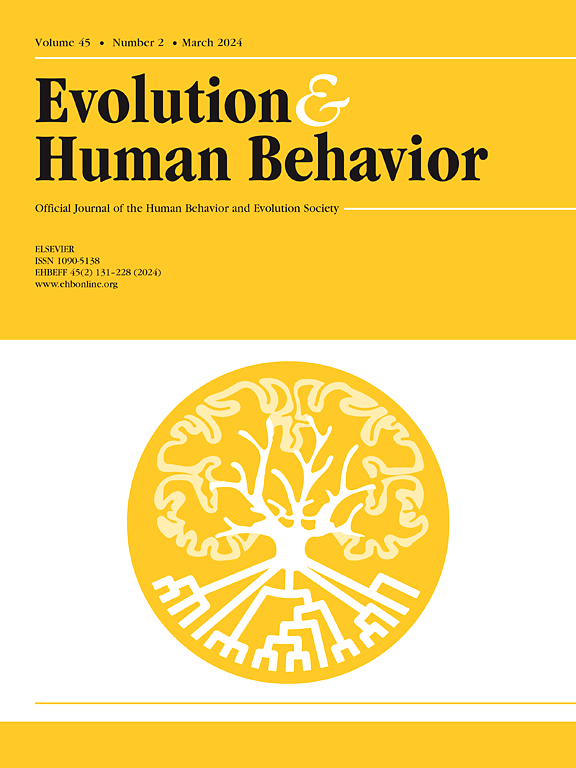表亲婚姻和荣誉文化的遗传标记
IF 3.2
1区 心理学
Q1 BEHAVIORAL SCIENCES
引用次数: 0
摘要
名誉文化的特点是对个人或家庭名誉受到的威胁做出暴力反应,这种文化非常普遍。名誉杀人是名誉文化的表现形式之一,每年有成千上万的妇女因此丧生,而且往往是死于近亲之手,这不仅是一个社会问题,也是一个进化难题。这种做法通常是在被指控性行为不端之后发生的,是控制妇女性选择和婚姻选择的一系列惩罚措施中最极端的表现形式。尽管在表兄妹婚姻盛行的地方经常出现荣誉文化,但这种习俗的起源仍不清楚。我们认为,表亲婚姻通过巩固财富为亲属带来利益,但也可能因婚姻选择而引发父母与后代之间的冲突。作为回应,规范和惩罚措施(包括荣誉法典的某些方面)可能已经演变为强制表亲婚姻。为了验证这一点,我们使用一个族群的平均基因组近亲繁殖系数来衡量历史上的表亲婚姻习俗,结果表明,在 52 个族群中,近亲繁殖系数与认可名誉杀人的可能性相关。我们在近亲结婚引发的父母与后代冲突的背景下解释了我们的研究结果,并为探索密集亲缘关系与文化特征之间关系的越来越多的研究做出了贡献。本文章由计算机程序翻译,如有差异,请以英文原文为准。
Genetic markers of cousin marriage and honour cultures
Honour cultures, characterized by violent responses to perceived threats to personal or family honour, are widespread. Honour killings, one of the manifestations of honour cultures, claims the lives of thousands of women each year, often at the hands of close relatives, representing not only a social problem but also an evolutionary puzzle. They typically follow accusations of sexual impropriety and are the most extreme manifestation of a range of punishments that control the sexual and marital choices of women. The origins of such practises remain unclear, though honour cultures frequently occur where cousin marriage is common. We propose that cousin marriage offers kin benefits through wealth consolidation yet may also generate parent-offspring conflict over marriage choices. In response, norms and punitive measures, including aspects of honour codes, may have evolved to enforce cousin marriage. To test this, we use the average genomic inbreeding coefficient of an ethnic group, as a measure of the historical practice of cousin marriage, to show that this is associated with the likelihood of endorsing honour killings across 52 ethnic groups. We interpret our findings within the context of parent-offspring conflict over consanguineous marriage and we contribute to the growing body of research exploring the relationship between intensive kinship and cultural traits.
求助全文
通过发布文献求助,成功后即可免费获取论文全文。
去求助
来源期刊

Evolution and Human Behavior
生物-行为科学
CiteScore
8.30
自引率
9.80%
发文量
62
审稿时长
82 days
期刊介绍:
Evolution and Human Behavior is an interdisciplinary journal, presenting research reports and theory in which evolutionary perspectives are brought to bear on the study of human behavior. It is primarily a scientific journal, but submissions from scholars in the humanities are also encouraged. Papers reporting on theoretical and empirical work on other species will be welcome if their relevance to the human animal is apparent.
 求助内容:
求助内容: 应助结果提醒方式:
应助结果提醒方式:


